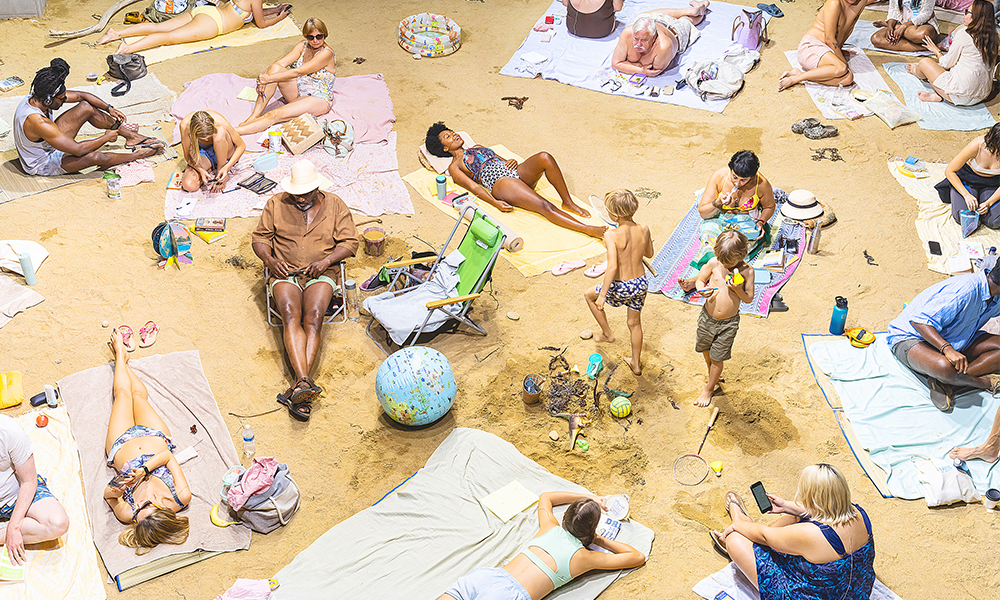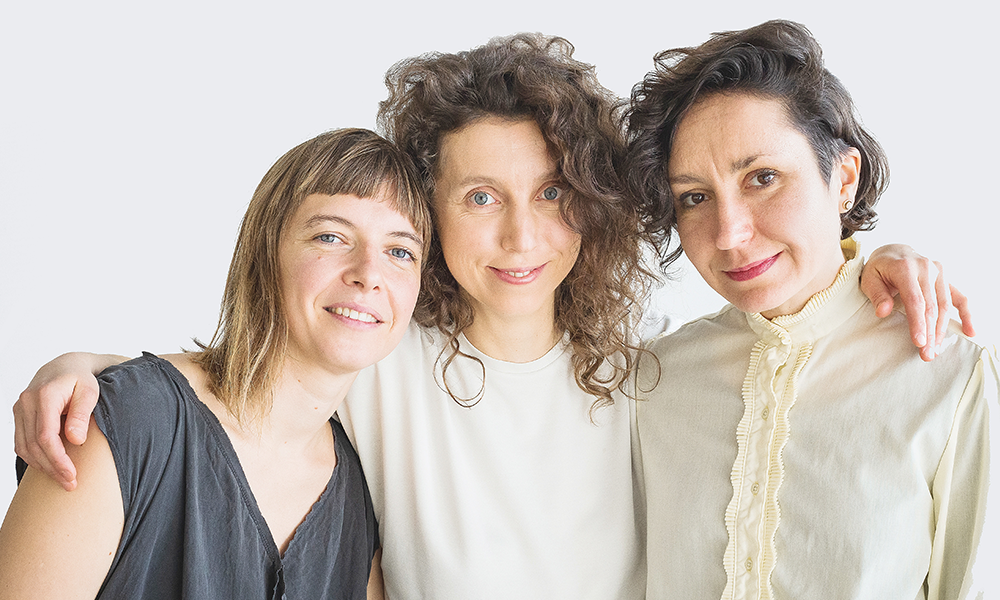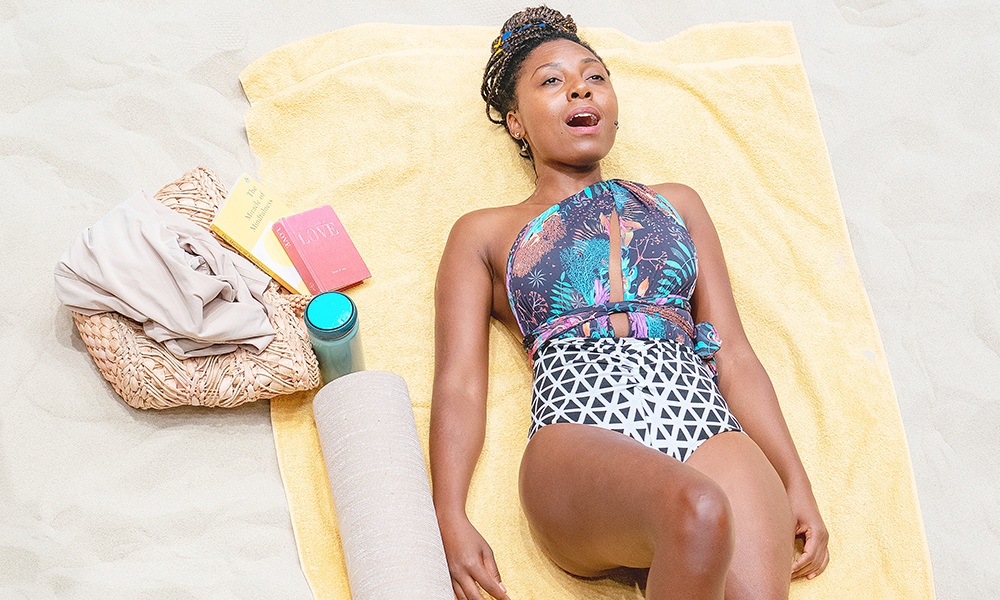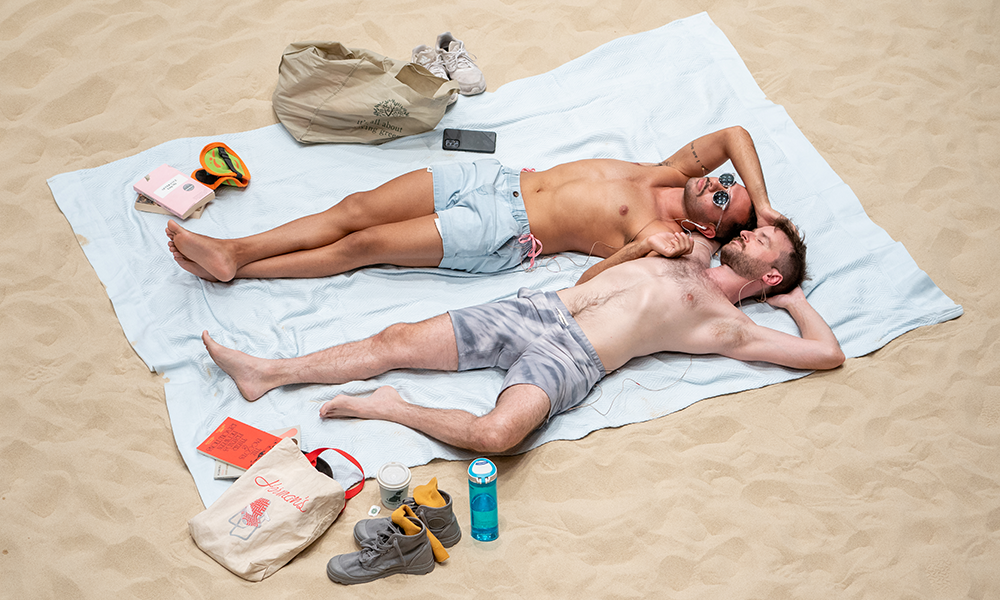We sit down with the composer, librettist and director of the sandy opera to find out more

Subscribe to Wharf Life’s weekly newsletter here
BY LAURA ENFIELD
A crowded beach, the burning sun, bright bathing suits and sweaty brows.
Sunbathers begin to sing languid songs of early morning flights, half-eaten sandwiches and plastic bags floating silently below the waterline.
Sun & Sea is an afternoon at the seaside, witnessed from above.
Audiences watch from the balcony as the mundane evolves into an urgent exploration of our relationship with the planet and the threat of climate change.
The show stunned audiences at the 2019 Venice Biennale and makes its UK debut at The Albany from June 23-July 10, 2022, co-presented with LIFT and Serpentine.
Ten tons of sand will be used to transform the stage for the “durational performance”, which unfolds on a loop over several hours.
The performers will include local singers and 13 vocalists taking on the role of beach-goers enjoying the sunshine.
We sat down with composer Lina Lapelytė, librettist Vaiva Grainytė and director Rugilė Barzdžiukaitė to find out more.
why a beach?
Rugilė: The image of a singing beach came while touring with our first opera Have a Good Day!.
We were actively waiting for another idea. I was shooting my documentary film essay Acid Forest, which involved a birds-eye view. People were looked at from above as if they were animal species coming to one “cage” in a strange forest.
This inspired an angle from above on another “zoo”. A beach is the place where the fragility of bodies is exposed. It made us think about the parallel with cosmic bodies, the fragility of the planet Earth.
The visual, textual and musical layers of Sun & Sea are inseparable and make this work complex. However, in this complexity, we seek simplicity.
Lina: The idea to perform on the beach came gradually. We were looking for a situation that would allow for different individuals to coexist, a place to reflect society.
The beach is the place where everyone becomes kind of equal under the sun. Swimsuits unify people – they get exposed to the planetary body that heals and is dangerous at the same time.
At the beach, people mix up – you can meet a university professor, a banker and a hairdresser. It’s a place where their thoughts can meet too.
We wanted to have a collective voice – a choir, that is driven by different attitudes, different thoughts – however, united by the time and place.
why climate change?
Lina: The work is labelled as climate change opera, but we wouldn’t rule out this being the second episode of Have a Good Day! that we sometimes, ironically, call an ode to capitalism.
While Sun & Sea puts the joy of consumption on the sandy beach, my personal approach is through body politics: the parallel between the body of a human and the body of Earth.
Rugilė: Passive lying around, the lazy burning away of time and the body – this is the surface of the work. People are only resting, but the axis that holds the whole mosaic of the opera together is a sun which is getting hotter and the exhausted Earth.
The message about the inevitability of consumption, which we developed in our previous collaborative work, is now delicately incarnated in ecological themes.
Vaiva: The opera consists of smaller sub-topics that can be found as fragments in the libretto of Sun & Sea. These themes are related to the pleasures of consumption, time, climate change, boredom in everyday life, pollution, tourism, the interconnection of hedonism and the apocalypse, skin care, depression, nutrition and technology.
why an opera?
Lina: Opera reflects the Gesamtkunswerk – a total work of art. However, we feel the term can be off-putting sometimes as people expect a traditional treatment of voices and stage.
We try to challenge the term – to use the potential the genre can offer.

how long have you been friends?
Vaiva: Since teenage times. We all grew up in Kaunas in Lithuania, so share a very similar collective memory of certain topography.
Lina and I used to hitchhike and hang around in underground concerts, while me and Rugile studied in the same photography school. This is the core of our collaborative practice.
Rugilė: Another level of friendship started when we realised how closely our ideas resonated while thinking about our first piece.
Lina: It is also an intellectual friendship – we share some viewpoints and have similar feelings towards many things.
how long did it take to create?
Rugilė: The piece was developed during a residency at Akademie Schloss Solitude in 2016, then presented as a micro-opera at the gallery Palermo in Stuttgart with a premiere in full the following year.
In 2018 the artists presented the German version in Dresden and the work was selected to represent Lithuania at the Venice Biennale – where the English and durational version was developed.
what impact has Covid had?
Vaiva: As the piece was touring during the pandemic, sanitation breaks, masked audience members, peeping from above, observing unmasked holiday goers, made the beach look like an idyllic postcard from the past.
The lyrics from the libretto, originally referring to the eruption of Eyjafjallajökulls, which has brought all travelling into paralysis, suddenly sounded like a reflection of the current situation. The connotations of the piece change and closely coexist with current events.

has the show changed for the UK?
Rugilė: Sun & Sea is a mix of fiction and documentary, so the show is always shifting. The musical and textual layers are fixed, the colour palette is fixed but the local beachgoers and choir members bring their natural habits to the beach.
We ask them to avoid acting, but to do whatever they like and feel comfortable doing on a real beach.
is the local choir new for London?
Lina: Integrating the local choir has always been important. It does not happen everywhere, but we try.
Integration of local people started in Venice with not only the choir but also solo singers, some of whom continue to tour.
does lying down affect the singers?
Lina: It is a challenging position to sing in, no-one gets to learn this in music schools, but the people we work with are embracing these kinds of challenges.
It’s not just lying down – it’s also occasionally sand landing in your throat while you sing, or a naughty dog taking over your aria, or children freestyling when you need to focus. The piece is life more than a performance.

talk to me about the viewpoint
Rugilė: The audience is looking down to the beach from above, focusing on peculiar species, living on the sand down below.
Usually, we tend to use this perspective to observe bugs or other smaller animals than us – this creates some sort of hierarchy.
Balconies frame the beach from all directions and it helps to close the potentially superficial perspective of the sea and the sky.
Lastly, the angle from above allows the audience to see the singers lying and singing in a frontal position.
what should audiences take away?
Vaiva: The piece has lots of sub-messages and different overtones. It’s both light, bright, joyful, deeply sad, and sorrowful.
It’s up to each audience member to pick up on certain aspects. Therefore Sun & Sea is based on a dissonance – the feeling of catastrophe lurking in the air is wrapped in a contrasting sunny surface. Darker and ironic lyrics are interwoven with pop melodies. Micro stories of the characters told from the “I” perspective allow viewers to connect to the beachgoers emotionally, rather than intellectually.
Even though the opera-performance is climate crisis-themed, it doesn’t suggest any solutions, but rather allows audience members to enter the realm of pure melancholy, and embrace the feeling of the end.
Read more: Discover Samskara at The Yard theatre in Hackney Wick
Read Wharf Life’s e-edition here
Subscribe to Wharf Life’s weekly newsletter here
- Laura Enfield is a regular contributor to Wharf Life, writing about a wide range of subjects across Docklands and east London



